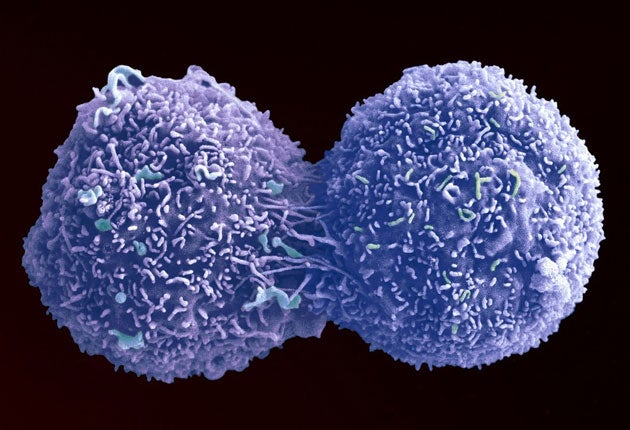Better detection and drugs will cut cancer death rate by a sixth
Experts predict that risk of dying will continue to fall for the next 15 years

The risk of dying from cancer before the age of 84 is falling and will continue to do so for at least the next 15 years, experts predict.
Early detection, improved treatments and the decline in smoking will together cut the overall death rate by17 per cent among men and 16 per cent among women by 2023, compared with 2003. Scientists from Cancer Research UK based their predictions on trends since 1975. Of 21 cancers, death rates in all but four are falling in men and in all but three in women.
However, the overall number of deaths from cancer will rise because of the ageing population, putting an increased burden on the NHS. Deaths among men are set to grow from 80,000 a year to 103,000 and among women from 74,000 to 82,000.
The chances of dying from cancer of the lung, colon, stomach and bladder are each expected to decline by at least a third for men. Among women, death rates from cancer of the colon, stomach and larynx will fall by more than a third and cervical cancer deaths are projected to plummet by more than half.
Breast cancer death rates have seen the most significant fall in the past 20 years, despite the rising incidence of the disease, declining at about 1 per cent a year. Over the next 20 years (from 2003) breast cancer death rates are set to fall a further 28 per cent.
The risk of dying from prostate cancer is falling at a similar rate although more men are being diagnosed. Over 20 years it will decline by 12 per cent.
Professor Peter Sasieni, epidemiologist at the Wolfson Institute of Preventive Medicine and lead author of the study, published in the British Journal of Cancer, said: "There are two reasons why we have seen a fall in cancer death rates. Firstly, the chance of developing cancer is reducing as a result of lifestyle changes such as stopping smoking and better food hygiene. Secondly, more people are surviving cancer because, thanks to research, there are better treatments and more effective screening programmes. We are predicting that the fall in cancer death rates will continue in the next 20 years."
The risk from certain cancers is set to rise. Among men, small increases in death rates from cancer of the oesophagus, mouth and malignant melanoma (of the skin) are predicted, and a larger increase (14 per cent) from cancer of the liver. Cancer of the liver and oesophagus are linked with obesity.
Among women, the only predicted rise is in death rates from cancer of the lining of the womb (18 per cent over 20 years), which is also linked with obesity.
Lesley Walker, director of information at Cancer Research UK, said: "The projections for the next 20 years are really encouraging. The researchers have assumed current trends will continue. However, we hope that with new developments the drop in the risk of dying from cancer by 2025 will be even more dramatic."
Cancer: Declining death rates
Men
Stomach 43 per cent
Colon 32 per cent
Bladder 32 per cent
Lung 31 per cent
Larynx 31 per cent
Women
Cervix 57 per cent
Stomach 36 per cent
Colon 36 per cent
Larynx 32 per cent
Breast 28 per cent
Figures show expected fall 2003-2023
Subscribe to Independent Premium to bookmark this article
Want to bookmark your favourite articles and stories to read or reference later? Start your Independent Premium subscription today.

Join our commenting forum
Join thought-provoking conversations, follow other Independent readers and see their replies